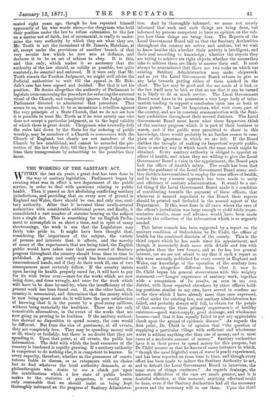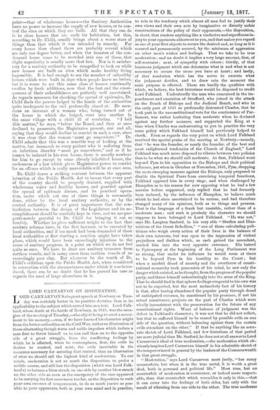THE WORKING OF THE SANITARY ACT.
WITHIN the last six years, a great deal has been done in the way of sanitary legislation. Parliament began by creating what was in effect a new department of the public service, in order to deal with questions relating to public health. Then it passed an Act abolishing conflicting sanitary jurisdictions, and providing that on every acre of ground in England and Wales, there should be one, and only one, sani- tary authority. After that it invested these newly-created authorities with considerable additional power, and finally, it consolidated a vast number of statutes bearing on the subject into a single Act. This is something for an English Parlia- ment to accomplish in so short a time, and in spite of many shortcomings, the work is one that the Legislature may fairly take pride in. It might have been thought that, considering the importance of the subject, the variety of persons and interests that it affects, and the novelty of many of the experiments that are being tried, the English public would have taken care that some record of Sanitary progress throughout the country should from time to time be published. A great and costly work has been committed to unaccustomed hands, and if they do their work ill, one of two consequences must certainly follow. If the country insists upon having its health properly cared for, it will have to pay for its wish twice over,—once for the works which are now being done, and done wrongly, and once for the work which will have to be done by-and-by, when the insufficiency of the present work has been found out. If, on the other hand, the country is economical, and determines that the money which is now being spent must do, it will have the poor satisfaction of knowing that it is the poorer by a good many millions, without being materially the healthier. These are the only conceivable alternatives, in the event of the works that are now going on proving to be fruitless. If the sanitary authori- ties showed no disposition to spend money, the case would be different. But from the vice of parsimony, at all events, they are completely free. They may be spending money well or ill, wisely or foolishly, but there is no doubt that they are spending it. Upon that point, at all events, the public has information. The debt with which the local resources of the country is burdened is rapidly growing. If a sanitary authority is competent to do nothing else, it is competent to borrow. In every capacity, therefore, whether as the possessors of consti- tutions liable to disease, or as ratepayers with no choice but to find whatever the local authority demands, or as philanthropists who desire to see a check put upon the contributions which a low state of public health makes to the statistics of pauperism, it would seem only reasonable that we should insist on being kept thoroughly informed on the progress of Sanitary Administra-
tion. And by thoroughly informed, we mean not merely informed that such and such things are being done, but informed by persons competent to have an opinion on the sub- ject how these things are being done. The Reports of the Local Government Board tell us that the Sanitary Authorities throughout the country are active and zealous, but we wish to know besides this whether their activity is intelligent, and their zeal according to knowledge ; whether the objects they are trying to achieve are right objects, whether the means they take to achieve them are likely to answer their end. It must always be remembered that there are two rocks on which our existing Sanitary Administration may make shipwreck, and as yet the Local Government Board refuses to give us any help towards getting either of them marked in the chart. The law may be good and the use made of it bad, or the law itself may be bad, so that no use that it can be turned to is likely to do us much service. The Local Government Board must have in its possession a very large body of infor- mation tending to support a conclusion upon one or both of these points. It has its Inspectors, who visit every part of the country, and are in constant communication with the Sani- tary authorities throughout their several districts. The Local Government Board must know what these Inspectors think of the sanitary progress which it is part of their business to watch, and if the public were permitted to share in this knowledge, there would probably be no further reason to com- plain of the ignorance in which we are left. If the Board dislikes the thought of making its Inspectors' reports public, there is another way in which much the same result might be obtained. Every sanitary authority is obliged to appoint an officer of health, and when they are willing to give the Local Government Board a voice in the appointment, the Board pays half the officer of health's salary. The result has been that under the guidance of the Local Government Board many sani- tary districts have combined to employ the same officer of health, and in this way a nearer approach has been made to unity and efficiency of sanitary administration. It would be a use- ful thing if the Local Government Board made it a condition of contributing towards the payment of these officers, that whenever it seemed expedient to the Board, their reports should be printed and included in the annual report of the Department. If this were done in all cases where the area of the officer's jurisdiction was large enough to yield fairly repre- sentative results, some real advance would have been made towards the collection of the information which is so urgently needed.
This latter remark has been suggested by a report on the sanitary condition of Oxfordshire by Dr. Child, the officer of health for the combined districts of the county. This is the third report which he has made since his appointment, and though it necessarily deals more with details and less with principles than the two former, and so far has less general interest, yet we are not afraid to say that if such a report as this were annually published for every county in England and Wales, our knowledge of the operation of the sanitary laws would be altogether different from what it now is. Dr. Child began his general observations with this weighty statement :—" Longer experience of sanitary work, together with a comparison of its results, as seen in my own district, with those reported elsewhere by other officers hold- ing positions similar to my own, have served to confirm me in the view which I have already more than once expressed, —that under the existing law, our sanitary administration has failed, and probably always will fail, to obtain for the people of this country the three primary requirements of healthy existence—good water-supply, good drainage, and wholesome houses—and that it has equally failed to put any appreciable . check upon the spread of epidemic disease." As regards the first point, Dr. Child is of opinion that " the question of supplying a particular village with sufficient and wholesome water is seldom anything else than one of money, and in most cases of a moderate amount of money." Sanitary authorities have it in their power to spend money for this purpose, but Dr. Child assures us that he knows of many instances in which, "though the most frightful want of water is yearly experienced, and has been reported on from time to time, and though every effort has been made to induce the Sanitary Authority to act, and in default the Local Government Board to intervene, the same state of things continues." As regards drainage, the inherent difficulties of the case are much greater, and it is doubtful whether, at this moment, anything effectual could be done, even if the Sanitary Authorities had all the necessary powers and the necessary will to use them. Upon the third
point—that of wholesome houses—the Sanitary Authorities have no power to increase the supply of new houses, or to con- trol the sites on which they are built. All that they can do is to close houses that are unfit for habitation, but this, according to Dr. Child, usually brings about a worse state of things than that which it was intended to remedy. For every house thus closed there are probably several which are only one degree better, and when the inmates of the con- demned house come to be crowded into one of these, that slight superiority is usually more that lost. Nor is it satisfac- tory
for a sanitary authority to be compelled to look on while new houses are built on sites which make healthy living impossible. It is bad enough to see the number of unhealthy houses which were built in days when people knew no better, but it is worse to see this same class of houses continually swollen by fresh additions, now that the fact and the conse- quences of their unhealthiness are perfectly well ascertained. As regards measures for checking the spread of epidemics, Dr. Child finds the powers lodged in the hands of the authorities quite inadequate to the end professedly aimed at. He men- tions an instance of a woman who, being turned out of the house in which she lodged, went into another in the same village with a child ill of scarlatina. "I laid this matter," he says, " before the Board, and they at once declined to prosecute, the Magistrates present, one and all, saying that they would decline to convict in such a case, since , it was clear that the woman must go somewhere.' " Dr. Child admits that this was a sensible way of looking at the I matter, but inasmuch as every patient who is suffering from an infectious disorder " must go somewhere," and as if he cannot be isolated in his own house, there is usually nowhere for him to go except to some already inhabited house, the uselessness of a law which gives Magistrates power to convict for an offence which is really unavoidable will be at once seen.
Dr. Child draws a striking contrast between the apparent intention of the Public Health Act to insure that every part of the country should be properly drained, supplied with wholesome water and healthy houses, and guarded against the spread of epidemic disease, and its practical opera- tion, under which not one of these things is necessarily done, either by the local sanitary authority, or by the central authority. It is of great importance that the con- tradiction between the design of the Legislature and its ac- complishment should be carefully kept in view, and we are pro- portionately grateful to Dr. Child for bringing it out so forcibly. Whether he gives sufficient weight to the fact that sanitary reforms have, in the first instance, to be executed by local authorities, and if too much had been demanded of these local authorities at first starting a reaction might have taken place, which would have been exceedingly injurious to the cause of sanitary progress, is a point on which we do not feel quite so sure. We have to draw our sanitary treasures from earthen vessels, and in many cases from earthen vessels of an exceedingly poor clay. But whatever be the worth of Dr. Child's criticism upon the Public Health Act, when considered in connection with the circumstances under which it was intro- duced, there can be no doubt that he has proved his case as regards the need of large alterations in it.







































 Previous page
Previous page